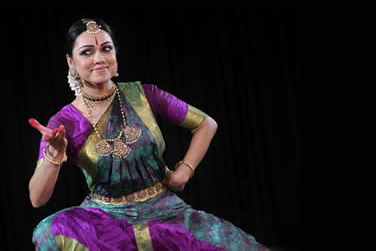Dakshina Summer Performances (SUNDAY CANCELLED)
Dakshina Summer Performances
Saturday, July 16: "Sokolow Gems: Kafka, Migrette, and Dreams"
Sunday, July 17: Rama Vaidyanathan in her solo production "Chitravalli"

Sunday: Cancelled: We apologize for any inconvenience, but Rama Vaidyanathan's solo performance on Sunday has been cancelled.
Event Attributes
Presented By
Saturday show: Dakshina/Daniel Phoenix Singh Dance Company returns to Dance Place with a full evening of Anna Sokolow favorites including “Kafka,” “Dreams” and “Magritte, Magritte.” Reviwing Dakshina’s performance of "Magritte, Magritte," The Washington Post's Sarah Kaufman lauds Lorry May’s restaging of the Sokolow classics on Dakshina and writes: “Yet Sokolow isn’t so surreal after all. If Magritte’s paintings take us away from reality, Sokolow’s treatment of them returns us to this world. It can’t help but do so. We’re watching human beings. In Sokolow’s hands — as interpreted by May and Singh’s strong cast — they speak to the outsider in all of us.”
From the Diaries of Franz Kafka, is Sokolow’s own dramatization of Kafka’s Metamorphosis. Ernestine Stodelle wrote in the Art Times that “Sokolow’s tribute to the great German writer takes the form of an acted-out replay of Kafka’s suppressed inner life. The effect is searing, audiences are stirred to the depths.” Both the Kafka and Magritte dances are inspired by the writings and paintings of these larger than life artists who were ahead of their times in both style and commentary. Perhaps Sokolow saw kindred spirits in these fellow artists when she adapted their works and brought them to life.
The evening will close with Sokolow’s signature work "Dreams". "Dreams" is based on images from the concentration camps of the Holocaust and inspired by scenes found in books like “The Diary of Anne Frank” and “The Last of the Just.” Anna Sokolow was a member of the Martha Graham company in the 1930’s. As Sokolow developed her own work she turned her attention to dances about social and historical concerns like industrial justice, juvenile delinquency and the glorification of war. In “Dreams,” her choreography weaves a whole picture – in angular, arresting forms – out of a wide variety of scenes from the camps. The work was a searing commentary on the social cost of war, and is particularly timely given the rhetoric against refugees in our world today.
Visit Dakshina’s website at www.dakshina.org for more details.
